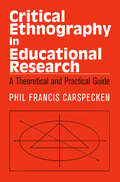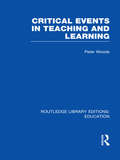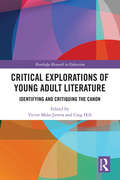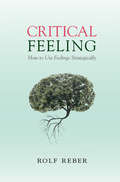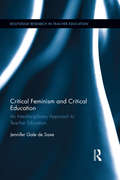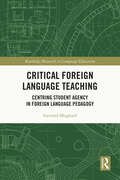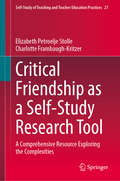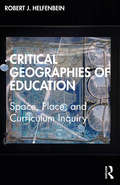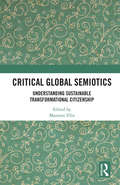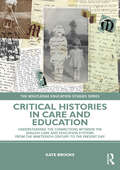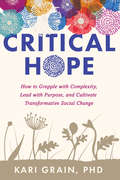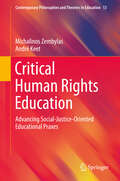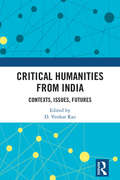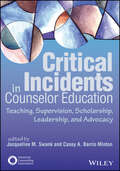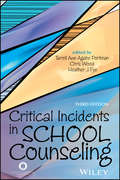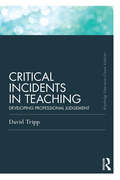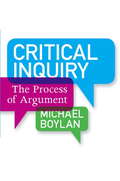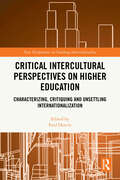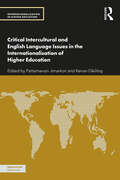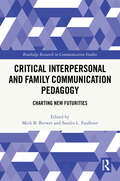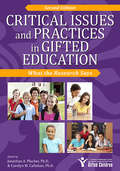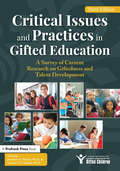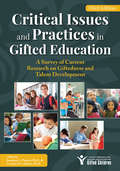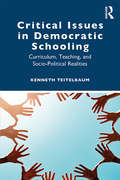- Table View
- List View
Critical Ethnography in Educational Research: A Theoretical and Practical Guide (Critical Social Thought)
by Francis Phil CarspeckenEthnographic methods are becoming increasingly prevalent in contemporary educational research. Critical Ethnography in Educational Research provides both a technical, theoretical guide to advanced ethnography--focusing on such concepts as primary data collection and system relationships--and a very practical guide for researchers interested in conducting actual studies.
Critical Events in Teaching & Learning (Routledge Library Editions: Education)
by Peter WoodsThis volume describes and analyses exceptional educational events – periods of particularly effective teaching representing ultimates in teacher and pupil educational experience. The events themselves are reconstructed in the book through teacher and pupil voices and through documentation. A model of ‘critical event’ is derived from the study, which might serve as a possible framework for understanding other such occurrences in schools.
Critical Explorations of Young Adult Literature: Identifying and Critiquing the Canon (Routledge Research in Education)
by Crag Hill Victor Malo-JuveraRecognizing the determination of a canon as an ongoing process of discussion and debate, which helps us to better understand the concept of meaningful and important literature, this edited collection turns a critical spotlight on young adult literature (YAL) to explore some of the most read, taught, and discussed books of our time. By considering the unique criteria which might underpin the classification of a YAL canon, this text raises critical questions of what it means to define canonicity and designate certain books as belonging to the YAL canon. Moving beyond ideas of what is taught or featured in textbooks, the volume emphasizes the role of adolescents’ choice, the influence of popular culture, and above all the multiplicity of ways in which literature might be interpreted and reflected in the lives of young readers. Chapters examine an array of texts through varied critical lenses, offer detailed literary analyses and divergent interpretations, and consider how themes might be explored in pedagogical contexts. By articulating the ways in which teachers and young readers may have traditionally interpreted YAL, this volume will extend debate on canonicity and counter dominant narratives that posit YAL texts as undeserving of canonical status. This text will be of great interest to graduate and postgraduate students, academics, professionals, and libraries in the field of young adult literature, fiction literacy, children’s literacy and feminist studies.
Critical Feeling
by Rolf ReberHow can we develop the sensitivity necessary for playing music or making crafts? How can teachers make their lessons interesting? In what ways can consumers avoid undue influence? How do we acquire refined tastes, or come to believe what we want to believe? Addressing these issues and providing an account for tackling personal and societal problems, Rolf Reber combines insights from psychology, philosophy, and education to introduce the concept of 'critical feeling'. While many people are familiar with the concept of critical thinking, critical feeling denotes the strategic use of feelings in order to optimize an outcome. Reber discusses the theoretical and empirical foundations of critical feeling and provides an overview of applications, including well-being, skill learning, personal relationships, business, politics, school, art, morality, and religion. This original and thought-provoking study will interest a broad range of researchers, students, and practitioners.
Critical Feminism and Critical Education: An Interdisciplinary Approach to Teacher Education (Routledge Research in Teacher Education)
by Jennifer Gale De SaxeChallenging the current state of public education and teacher preparation, this book argues for a re-imagination of teacher education through a critical feminist and critical education perspective. Offering a rich discussion of the promise and pedagogy of self-reflexivity and testimonio, which emerges from critical feminism, this book brings together theory and practice in critical feminism, critical education, and testimonio to serve as a platform in which to reconceptualize the philosophy of traditional teacher education, arguing that too many programs prepare teachers who often preserve, rather than challenge, the status quo.
Critical Foreign Language Teaching: Centring Student Agency in Foreign Language Pedagogy (Routledge Research in Language Education)
by Gerrard MugfordThis book develops the theory and practice of critical foreign language pedagogy. Written by a distinguished scholar of pragmatics and sociolinguistics, it encourages educators to think beyond traditional methods of language teaching to consider both the social reality of being a foreign language user and the personal goals and experiences of each learner. It emphasises the need to teach students how to navigate the types of interactional difficulties, power imbalances, and hostility they may experience outside of the classroom as well as how to recognise and analyse ‘native’ speaker norms and practices. It further stresses the importance of first-language knowledge in developing foreign language expertise, encouraging educators to build on the skills learners already have to empower them to express their personality and individuality in their target language.A significant contribution to foreign language pedagogy, this book offers language teachers, bilingual speakers, and researchers practicable insights into how to support learners to attain and realise their own goals and aspirations in their target language.
Critical Friendship as a Self-Study Research Tool: A Comprehensive Resource Exploring the Complexities (Self-Study of Teaching and Teacher Education Practices #27)
by Elizabeth Petroelje Stolle Charlotte Frambaugh-KritzerThis book provides qualitative scholars, particularly those in self-study, with timely research and practical resources for applying critical friendship as a research tool. Drawing on over two decades of engagement as critical friends, the authors advocate for critical friendship as a means to enhance research rigor. Long valued within self-study methodology, critical friendship offers researchers opportunities for collaboration, inquiry, and reflection. Despite its widespread use, ambiguity persists about its enactment. This book addresses the need for a comprehensive resource on critical friendship application focused solely on the theoretical and methodological understanding of critical friendship. It offers clarity on tools while exploring the complexities of critical friendship. This book makes a significant contribution to the field by expanding on key topics such as trustworthiness, characteristics of critical friendship, and the selection and evaluation of critical friends. It is designed for both seasoned and novice qualitative self-study scholars, providing insight for those seeking to integrate critical friendship into their research practice.
Critical Geographies of Education: Space, Place, and Curriculum Inquiry
by Robert J. HelfenbeinCritical Geographies of Education: Space, Place, and Curriculum Inquiry is an attempt to take space seriously in thinking about school, schooling, and the place of education in larger society. In recent years spatial terms have emerged and proliferated in academic circles, finding application in several disciplines extending beyond formal geography. Critical Geography, a reconceptualization of the field of geography rather than a new discipline itself, has been theoretically considered and practically applied in many other disciplines, mostly represented by what is collectively called social theory (i.e., anthropology, sociology, cultural studies, political science, and literature). The goal of this volume is to explore how the application of the ideas and practices of Critical Geography to educational theory in general and curriculum theorizing in specific might point to new trajectories for analysis and inquiry. This volume provides a grounding introduction to the field of Critical Geography, making connections to the significant implications it has for education, and by providing illustrations of its application to specific educational situations (i.e., schools, classrooms, and communities). Presented as an intellectual geography that traces how spatial analysis can be useful in curriculum theorizing, social foundations of education, and educational research, the book surveys a range of issues including social justice and racial equity in schools, educational reform, internationalization of the curriculum, and how schools are placed within the larger social fabric.
Critical Geographies of Education: Space, Place, and Curriculum Inquiry
by Robert J. HelfenbeinWINNER 2023 Society of Professors of Education Outstanding Book AwardCritical Geographies of Education: Space, Place, and Curriculum Inquiry is an attempt to take space seriously in thinking about school, schooling, and the place of education in larger society. In recent years spatial terms have emerged and proliferated in academic circles, finding application in several disciplines extending beyond formal geography. Critical Geography, a reconceptualization of the field of geography rather than a new discipline itself, has been theoretically considered and practically applied in many other disciplines, mostly represented by what is collectively called social theory (i.e., anthropology, sociology, cultural studies, political science, and literature). The goal of this volume is to explore how the application of the ideas and practices of Critical Geography to educational theory in general and curriculum theorizing in specific might point to new trajectories for analysis and inquiry. This volume provides a grounding introduction to the field of Critical Geography, making connections to the significant implications it has for education, and by providing illustrations of its application to specific educational situations (i.e., schools, classrooms, and communities). Presented as an intellectual geography that traces how spatial analysis can be useful in curriculum theorizing, social foundations of education, and educational research, the book surveys a range of issues including social justice and racial equity in schools, educational reform, internationalization of the curriculum, and how schools are placed within the larger social fabric.
Critical Global Semiotics: Understanding Sustainable Transformational Citizenship
by Maureen EllisCritical Global Semiotics: Understanding Sustainable Transformational Citizenship incorporates powerful unifying frameworks which make explicit a developing global consciousness. It explores transdisciplinary ‘common wealth’ through focus on multimodality, media, and metaphor, testing two universally applicable humanitarian frameworks: critical realism (CR) and systemic functional semiotics (SFS). Every day, global citizens encounter an overwhelming host of genres and sub-genres, emergent semantic triangles, evolving semiotic trinity. Embodying philosophy, incorporating active engagement, this book addresses the political economy and cultural politics of diverse domains. Challenging daily drama and performative dharma, 24 analysts from 13 countries present current issues in Anthropology, Architecture, Dance, Feminism, Film, Health, Law, Management, Medicine, Music, Politics, Pharmaceuticals, Sociology, Sustainability Education, and Urban Development. The book’s integrative, unifying foundations will be of interest to researchers, academics, and post-graduate students in the fields of linguistics, semiotics, and critical realist philosophy, as well as to policy makers, curriculum developers, and civil society.
Critical Histories in Care and Education: Understanding the Connections Between the English Care and Education Systems from the Nineteenth Century to the Present Day (The Routledge Education Studies Series)
by Kate BrooksThis groundbreaking and thought-provoking book puts the care experience at the centre of education history. Engaging and accessible, Critical Histories in Care and Education provides historical insight to the growing field of care studies and reveals how nineteenth-century assumptions and prejudices about care-experienced pupils helped shape education policy and continue to do so today.Drawing together original archive research with critical theory and written by an academic researcher and writer who is a foster carer herself, the book challenges some of the key myths and stereotypes involving the care experience and shines an illuminating light on their origins. Aimed primarily at undergraduate and postgraduate students in education, this book identifies discursive threads and provides a fresh insight through a critical retelling of the history of the care system. In combining the histories of care and education, it challenges some taken-for-granted assumptions about both. Throughout the book, students are invited to critically examine relationships between gender, class, care and work, and how they continue to impact on the role today.The book is a vital resource for anyone involved in studying childhood, education, welfare and care, and will appeal to anyone wanting to broaden their knowledge and critical understanding of this complex topic.
Critical Hope: How to Grapple with Complexity, Lead with Purpose, and Cultivate Transformative Social Change
by Kari GrainIntroducing the 7 principles for practicing critical hope--because hope isn&’t something you have; it&’s something you do.Each person has a unique, ever-changing relationship to hope. Hope alone can be transformational--but in moments of despair, or when you&’re up against profound injustice, it isn&’t enough on its own. Hope without action is, at best, naive. At its worst, it tricks you into giving up the power and agency you have to change systems that cause suffering. Enter critical hope: a spark of passion, an abiding belief that transformation is not just possible, but vital. This is hope in action: a vibrant, engaged practice and a commitment to honoring transformative potential across a vast spectrum of experience. Dr. Kari Grain, PhD, offers 7 principles for practicing critical hope: • Hope is necessary, but hope alone is not enough • Critical hope is not something you have; it&’s something you practice. • Critical hope is messy, uncomfortable, and full of contradictions. • Critical hope is intimately entangled with the body and the land • Critical hope requires bearing witness to social and historical trauma • Critical hope requires interruptions and invitations • Anger and grief have a seat at the table The principles for practicing critical hope are not what you might think: they confront toxic positivity and take up discomfort, social injustices, and an ethos of hospitality toward anger and grief. But held in this same space is a love for connection–and an honoring of what makes you feel alive. Inspired by her global research, teaching experiences, and education curriculum taught at the University of British Columbia, Dr. Grain shows that to cultivate critical hope--and combat despair--you need to show up with your whole self, in all its messy, passionate, vibrant complexity.
Critical Human Rights Education: Advancing Social-Justice-Oriented Educational Praxes (Contemporary Philosophies and Theories in Education #13)
by Michalinos Zembylas André KeetThis book engages with human rights and human rights education (HRE) in ways that offer opportunities for criticality and renewal. It takes up various ideas, from critical and decolonial theories to philosophers and intellectuals, to theorize the renewal of HRE as Critical Human Rights Education.The point of departure is that the acceptable “truths” of human rights are seldom critically examined, and productive interpretations for understanding and acting in a world that is soaked in the violations these rights try to address, cannot emerge.The book cultivates a critical view of human rights in education and beyond, and revisits receivable categories of human rights to advance social-justice-oriented educational praxes. It focuses on the ways that issues of human rights, philosophy, and education come together, and how a critical project of their entanglements creates openings for rethinking human rights education (HRE) both theoretically and in praxis.Given the persistence of issues of human rights worldwide, this book will be useful to researchers and educators across disciplines and in numerous parts of the world.
Critical Humanities from India: Contexts, Issues, Futures
by D. Venkat RaoThe field of humanities generates a discourse that traditionally addressed the questions of what is proper to man, rights of man, crimes against humanity, human creativity and action, human reflection and performance, human utterance and artefact. The university as a philosophical-political institution transmits this humanist account. This European humanistic legacy, which is little more than Christian anthropology, barely received any questioning from cultures that faced colonialism. In such a context, this volume attempts to unravel the ‘barely secularized heritage’ of Europe (Derrida’s phrase) and its fatal consequences in other cultures. The task of Critical Humanities is to explore the ways in which the question of being human (along with non-human others) today from heterogeneous cultural ‘backgrounds’ can be undertaken. The future of the humanities teaching and research is contingent upon the risky task of configuring cultural difference from non-European locations. Such a task is inescapable and urgently needed when tectonic cultural upheavals have begun to show devastating effect on planetary coexistence today. It is precisely in such a context that this collection of essays on critical humanities affirms, ‘without alibi’, the urgency of collective reflection and innovative research across the traditional disciplinary and institutional borders and communication systems on the one hand and Asian, African and European cultural formations on the other. Critical Humanities are at one level little more than communities on the verge (critical) but whose centuries long survival and resilient creations of cultural (and /as natural) habitats are of deeply enduring significance to affirm the biocultural diversities of living that compose the planet. Topical and timely, this book will be useful to scholars, researchers and teachers of cultural theory, literary studies, philosophy, cultural geography, legal studies, sociology, history, performance studies, environmental studies, caste and communalism studies, postcolonial theory, India studies, and education.
Critical Incidents in Counselor Education: Teaching, Supervision, Scholarship, Leadership, and Advocacy
by Casey A. Barrio Minton Jacqueline M. SwankIn this textbook, prominent counselor educators provide guidance on key aspects of counselor education through case incidents in which an educator, student, supervisor, supervisee, researcher, or leader in the field is facing an ethical, moral, legal, or professional dilemma. Forty diverse case scenarios spanning four CACREP Standard domains for doctoral programs focus on real-world application of theories, concepts, and techniques. The incidents provide multiple perspectives on current issues faced in practice and promote learning opportunities for growth and development through critical thinking, discussion, and reflection. Each incident includes an evaluation of professional issues, a review of appliable ethical codes, a discussion of diversity and inclusion considerations, and an analysis of action steps and outcomes.
Critical Incidents in School Counseling
by Chris Wood Tarrell Awe Agahe Portman Heather J. FyeThis practical text explores contemporary case scenarios that arise in school counseling with children and adolescents. Throughout 30 chapters on a diverse range of topics, several school counseling experts analyze and discuss each incident from a best practices perspective. Topics are organized around the CACREP Standards and incidents include a list of related supplemental readings, online resources, and suggested learning activities. Issues explored include trauma, drug use, pregnancy, cyberbullying, suicide, gangs, parental conflicts, sexual orientation, third-culture students, student career development, and ethical and professional dilemmas. *Requests for digital versions from the ACA can be found on wiley.com.*To request print copies, please visit the ACA website.
Critical Incidents in Teaching (Classic Edition): Developing professional judgement
by David TrippWhat are theinstincts of a good teacher? Can they be taught? Good teachers use good techniques and routines, but techniques and routines alone do not produce good teaching. The real art of teaching lies in teachers' professional judgement because in teaching there is seldom one "right answer". This combination of experience, flexibility, informe
Critical Inquiry
by Michael BoylanA succinct handbook on reading and responding critically to argumentative texts, suitable alike for courses in informal logic and the argumentative/persuasive essay. aa
Critical Intercultural Perspectives on Higher Education: Characterizing, Critiquing and Unsettling Internationalization (New Perspectives on Teaching Interculturality)
by Fred DervinThis edited volume interrogates the meanings of internationalization in higher education in different political-economic contexts.Written by multidisciplinary scholars based in different parts of the world (China, Finland, France, Korea, Morocco, Saudi Arabia, Singapore, Spain, UK, USA), the chapters allow the reader to critically ‘listen in’ on glocalized (global + local) discourses of internationalization in education (meanings, epistemologies, critiques and current research/policies). The volume aims to support students and scholars in clarifying for themselves and others what internationalization might mean and entail, using alternative ways of characterizing, critiquing and unsettling internationalization. The authors adopt critical intercultural perspectives in their chapters, based, for example, on humanistic entry points, the continuum of ideological specificities-commonalities, while balancing self-other (acceptance, rejection), questioning the 'taken for granted' and offering some decolonial analyses and reflections. The volume thus aims to better understand and nuance the polysemic and glocalized nature of internationalization in order to strengthen international cooperation in education (research) and to provide more opportunities to come together to recognize and support, for example, multiple perspectives, experiences and knowledge.Scholars, students and education professionals interested in higher education, intercultural studies and topics of internationalization and globalization will greatly benefit from the book.
Critical Intercultural and English Language Issues in the Internationalisation of Higher Education (Internationalization in Higher Education Series)
by Kenan Dikilitaş Pattamawan JimarkonInternationalisation is key to a modern and diverse higher education. Closely related to this is the successful integration of different cultures and languages. This book explores the dynamic relationships between English as a Lingua Franca (ELF), intercultural communication competence (ICC), internationalisation, and the use of the English language in international higher education.Featuring contributions from authors from Türkiye, Slovenia, Thailand, Taiwan and Norway, the chapters discuss topics such as translanguaging, language-related policies in internationalisation, issues of language and interculturality from a contextual point of view of pedagogy, and provide critical reflections on perceptions and orientations in support of higher education internationalisation. Ultimately, the book provides a comprehensive understanding of how the English language functions as a tool for intercultural engagement in academic settings, and the ways in which it is encountered and perceived by researchers, leaders, and practitioners.This book will be valuable reading for applied linguists, teacher educators and researchers, and graduate students in higher education involved in internationalised higher education through teaching, projects and activities.
Critical Interpersonal and Family Communication Pedagogy: Charting New Futurities (Routledge Research in Communication Studies)
by Sandra L. Faulkner Mick B. BrewerThis volume establishes critical interpersonal and family communication pedagogy (CIFCP) as a distinct academic area of inquiry, highlighting the intersections of identity, power, culture, pedagogy, and interpersonal and family communication concepts, theories, and methods.This practical, theoretical, and aspirational collection by interpersonal and family communication (IPFC) scholars and teachers shines a spotlight on, through a diversity of methods, some of the ways that power both emanates within the classroom and informs intellectual instruction. Providing examples that connect critical theories and concepts with topics common in IPFC classrooms, such as conflict, relational tension, disclosure, listening, and family dynamics, the book illustrates how critical concepts can be uniquely addressed and unpacked in IPFC classrooms through a variety of assignments, teaching activities, and discussion prompts, and promotes and normalizes the ongoing reflexive practices of IPFC instructors.This book will interest academics and upper-level students working in the areas of Critical Methodology, Interpersonal Communication, Family Communication, and Relationship Science.
Critical Issues and Practices in Gifted Education
by Carolyn Callahan Jonathan PluckerCritical Issues and Practices in Gifted Education: What the Research Says is the definitive reference book for those searching for a summary and evaluation of the literature on giftedness, gifted education, and talent development. The book presents more than 50 summaries of important topics in the field, providing relevant research and a guide to how the research applies to gifted education and the lives of gifted children. This second edition updates every topic with new research and introduces several critically important topics such as cluster grouping, Response to Intervention, programming standards, the Common Core State Standards, educational leadership, and legal issues. This book provides an objective assessment of the available knowledge on each topic, offers guidance in the application of the research, and suggests areas of needed research.
Critical Issues and Practices in Gifted Education: A Survey of Current Research on Giftedness and Talent Development
by Jonathan A. PluckerCritical Issues and Practices in Gifted Education is the definitive reference for a summary and evaluation of the literature on giftedness, gifted education, and talent development. This third edition:Presents more than 40 summaries of important topics in the field.Features updates to all topics.Introduces new topics, including neuroscience and the roles of leaders in the field.Dives into the latest research.Explores how the research applies to gifted education and the lives of gifted learners.This book also provides an objective assessment of the available knowledge on each topic, offers guidance in the application of the research, and suggests areas of needed research.
Critical Issues and Practices in Gifted Education: A Survey of Current Research on Giftedness and Talent Development
by Ph. D. And Carolyn M. Callahan Jonat PluckerCritical Issues and Practices in Gifted Education is the definitive reference for a summary and evaluation of the literature on giftedness, gifted education, and talent development. This third edition:Presents more than 40 summaries of important topics in the field.Features updates to all topics.Introduces new topics, including neuroscience and the roles of leaders in the field.Dives into the latest research.Explores how the research applies to gifted education and the lives of gifted learners.This book also provides an objective assessment of the available knowledge on each topic, offers guidance in the application of the research, and suggests areas of needed research.
Critical Issues in Democratic Schooling: Curriculum, Teaching, and Socio-Political Realities
by Kenneth TeitelbaumFocusing on a wide range of critical issues, this book provides a comprehensive analysis of the linkage of different educational ideas, policies, and practices to a commitment for democratic schooling. Informed by significant, interdisciplinary research, as well as by his own extensive professional experiences as a teacher, professor, department chair, and dean, Teitelbaum examines contemporary concerns related to three broad areas: 1) teaching and teacher education; 2) curriculum studies; and 3) multiculturalism and social justice. His approach is to integrate the current and the historical, the practical and the theoretical, the technical and the socio-political, and the personal and the structural. With this volume, Teitelbaum considers how schools should be organized and funded, what they should teach and to whom, the role that teachers, students, and parents should play in school life, and the need and prospects for schools and teacher education programs that foster meaningful learning, critical reflection, and social justice.
